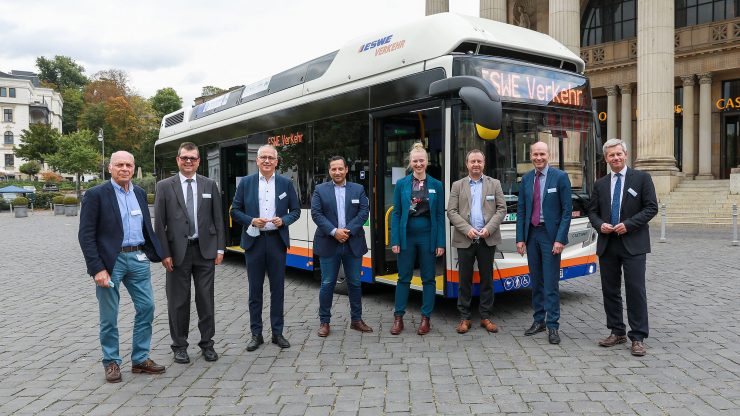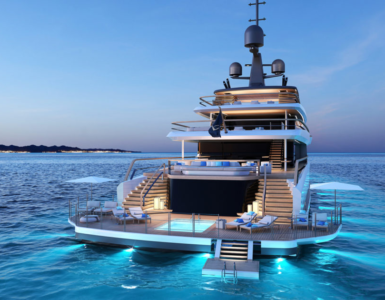ESWE Verkehr presents its first own fuel cell bus.
Diesel drive is becoming less and less important in ESWE Verkehr’s bus fleet. The mobility service provider of the state capital Wiesbaden, ESWE Verkehr, had put ten fuel cell buses out to tender throughout Europe in June 2020.
From the submitted bids, the Portuguese vehicle manufacturer CaetanoBus S.A. emerged as the winner. His model “H2. City Gold” was able to meet all the desired criteria. EsWE Verkehr’s first own fuel cell bus was received as part of a ceremony. The mobility service provider is thus reaching the next milestone in the company’s history.
Since the new and emission-free vehicles are paid for to a large extent from subsidies, representatives of the funding agencies had also announced themselves at the meeting in
Wiesbaden. Among them is Elena Hof, Programme Manager of the National Innovation Programme Hydrogen and Fuel Cell Technology at NOW GmbH.
🔥 What about we co-host a webinar? Let's educate, captivate, and convert the hydrogen economy!
Hydrogen Central is the global go-to online magazine for the hydrogen economy, we can help you host impactful webinars that become a global reference on your topic and are an evergreen source of leads. Click here to request more details
In her introductory remarks, she emphasized the special importance of hydrogen as an energy carrier and its high environmental compatibility as well as future viability: “Hydrogen and fuel cell technology is an important future technology for Germany as a business and mobility location. In public transport, hydrogen propulsion is a useful addition to battery vehicles in order to achieve the climate targets, especially for long and topographically demanding routes.”
As a mobility service provider for the state capital Wiesbaden, ESWE Verkehr pursues the goal of locally emission-free public transport. Fuel cell technology works using so-called green hydrogen. This is the most sustainable hydrogen variant and a central building block for improving the air and quality of life in Wiesbaden. The new and emission-free fuel cell buses are an important part of the air pollution control plan of the state capital Wiesbaden.
Tarek Al-Wazir, Minister of Economic Affairs and Transport of Hesse, said:
Emission-free mobility is an existential task for Hesse for reasons of climate protection and air pollution control.
“Alternative drive technologies play an important role here, also with hydrogen. That is why the state has also promoted the associated hydrogen filling station. But it is also clear that hydrogen does not occur naturally, it has to be produced at high cost. It is therefore not climate- and environmentally friendly by itself, but only if it is obtained from renewable energies and used where other solutions are not possible.”
“Therefore, the expansion of wind energy and other renewable sources must be promoted in parallel. The new fuel cell bus, which will drive through the Hessian state capital in the future, is an addition to the battery-electric buses, which are already gradually replacing diesel vehicles in Wiesbaden. It can be a solution especially for long-running lines and more difficult topographies and shows that public transport plays a central role in climate protection and the transport transition. This makes it all the more pleasing that more fuel cell buses will be added by the end of the year. They ensure cleaner air and less noise in the city.”
A further nine fuel cell buses are to be delivered from Portugal to Wiesbaden by the end of December 2021.
ESWE Verkehr has already gained more than a year of experience with a hydrogen filling station on its own premises and a rented fuel cell bus. Due to their range, depending on the application profile and weight of the bus between at least 350 and 400 kilometers, the fuel cell buses are preferably used on longer bus lines. The new buses are refuelled in well under 15 minutes. However, the crucial thing is that ESWE Verkehr is taking another major step towards achieving its corporate goal of “Our Vision – Zero Emissions”.
Andreas Kowol Wiesbaden’s head of transport:
Today, no one can say with certainty whether hydrogen or battery buses will prevail in the end – or both side by side.
“That is why we at ESWE Verkehr use both technologies with an open mind. Today we are getting a step closer to the goal of climate-neutral public transport. I would like to thank all those involved, especially the funding agencies and the city council for making such innovations financially possible.”
Bart Biebuyck, Executive Director, Fuel Cells and Hydrogen Joint Undertaking, said:
We are delighted to bring an innovative fleet of ten fuel cell buses to the streets of Wiesbaden.
“We are convinced that this will be an important milestone for clean and more efficient public transport. Our company wants to support the introduction of innovative hydrogen solutions throughout Europe. With its zero-emission buses, the JIVE programme is an important contribution to reducing the CO2 footprint in our cities.”
Jörg Gerhard, The host of the event and managing director of ESWE Verkehr expresses his gratitude to the supporters of the project:
Today my special thanks go to our funding agencies.
“First of all, the European Union and the Federal Ministry of Transport and Digital Infrastructure. With the funding, we are once again taking a big step forward in the conversion of our emission-free bus fleet and the associated infrastructure. Not least as a result, our company is changing from a transport company to a modern and sustainable mobility service provider for the state capital Wiesbaden.”
“ESWE Verkehr continues to pursue a technology-open approach in its conversion strategy. We firmly believe that hydrogen and fuel cell technology can and will make a significant contribution to the sustainability of public transport in Wiesbaden.”
The vehicles are funded by the EU project “JIVE” (Joint Initiative for Hydrogen Vehicles across Europe) with 1.95 million euros and especially within the framework of the EU program “Fuel Cells and Hydrogen Joint Undertaking” (FCH JU). Further funding is provided with a total of 1.685 million euros by the National Innovation Programme Hydrogen and Fuel Cell Technology (NIP) of the Federal Ministry of Transport and Digital Infrastructure (BMVI).
The funding guideline is coordinated by NOW GmbH and implemented by Projektträger Jülich (PTJ). Further details on the new buses can be found at: https://www.eswe-verkehr.de/brennstoffzellenbus.html About the FCH JU logo and the name as well as “JIVE” and the funding line for the project: The JIVE project was funded by the Fuel Cell and Hydrogen Joint Undertaking under Grant Agreement No. 735582.
This Joint Undertaking is supported by the European Union’s Horizon 2020 research and innovation programme, Hydrogen Europe and Hydrogen Europe Research. Important technical details about the vehicle: Manufacturer: CaetanoBus S.A., Portugal Model: H2.
ESWE Verkehr presents its first own fuel cell bus, October 6, 2021








